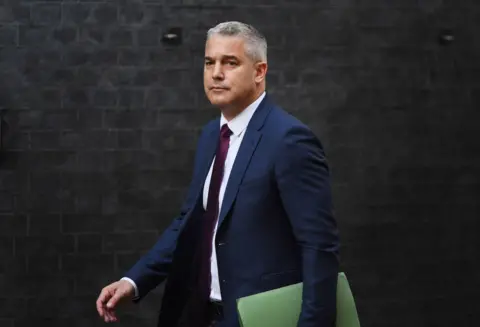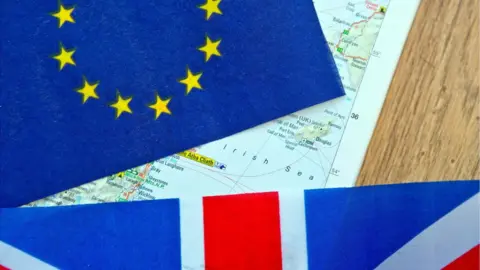Brexit: No checks on goods between NI and GB, says PM
Prime Minister Boris Johnson has briefed Conservative Party members in Northern Ireland on his Brexit deal.
The Brexit deal has major implications for Northern Ireland.
The region will continue to follow many EU rules on food and other manufactured goods, while the rest of the UK will not.
Northern Ireland will still be part of the UK's customs territory but it will also continue to follow EU customs rules.
That is likely to mean new bureaucracy for trade between Northern Ireland and the rest of the UK.
A clip of the briefing has been widely shared on social media. So did Boris Johnson get all the details correct?
1. "There will not be checks on goods going from Northern Ireland to Great Britain."
That is a long-standing UK government policy.
In 2017, it promised that Northern Ireland companies would continue to have "unfettered access" to the rest of the UK, no matter what the Brexit outcome.
Brexit Secretary Stephen Barclay has previously said there would be "limited targeted interventions" on trade from Northern Ireland into Great Britain.
Last month Mr Barclay said goods going from Northern Ireland to Great Britain would be subject to exit declarations.
He said that would amount to the filing of an electronic form, involving "fairly straightforward data".
 Chris J Ratcliffe
Chris J RatcliffeThe question then arises whether checks would ever have to be carried out to verify the accuracy of what is on the form.
The prime minister says no but many trade experts are sceptical about whether a policy of no checks could be maintained in the long term.
However, the precise details of how it would all work are yet to be explained.
2. "There will not be tariffs or checks on goods coming from GB to NI that are not going on to Ireland."
That is highly unlikely - when it comes to checks.
The deal means that Northern Ireland will remain part of a "single regulatory zone" with the Republic of Ireland, a zone that will apply EU rules.
The EU has particularly strict rules on the importation of "products of animal origin" - that is to say meat, fish and dairy products.
Those products must enter the EU through a border inspection post where all shipments are subject to document checks and a high proportion are physically checked.
Products of animal origin from Great Britain entering Northern Ireland would be subject to these checks whether they are destined for Northern Ireland or the Republic of Ireland.
 Getty Images
Getty ImagesA few countries, such as New Zealand, have a deal with the EU where only 1% of consignments are checked.
It is possible that the UK could negotiate a similar deal but it would not be able to eliminate checks entirely unless the whole of the UK was going to stay in the single market.
The current political declaration, which sets out the broad shape of the future EU-UK relationship, suggests that is unlikely.
There is a second issue to do with tariffs.
Goods which enter Northern Ireland from Great Britain and which are to be consumed in Northern Ireland will not have tariffs charged.
However, some classes of goods which are deemed "at risk" of being moved onward to the Republic of Ireland or the wider EU could be subject to tariffs.
If those goods are shown to have been consumed in Northern Ireland then the tariff can be rebated.
The definition of "at risk" and the rebate system will have to be negotiated during the post-Brexit transition period.
3. "Northern Ireland has got a great deal. You keep free movement. You keep access to the single market."
It is not completely clear what the prime minister means by "free movement" in this context.
Free movement of people is one of the core principles of the EU.
It gives all citizens of EU countries the right to travel, live and work wherever they wish within the EU.
The government has promised to end free movement and that will also apply in Northern Ireland.
It seems that Mr Johnson was referring to the continuation of the Common Travel Area after Brexit.
It is an arrangement between the UK and Ireland that pre-dates the formation of the EU.
It allows passport-free travel between the UK and Ireland and gives British and Irish citizens a range of rights in each other's countries.
On the single market, it is correct that Northern Ireland will have better access to the EU's single market for goods compared to the rest of the UK.
However, that does not extend to the single market for services.
